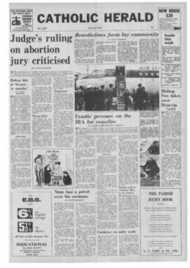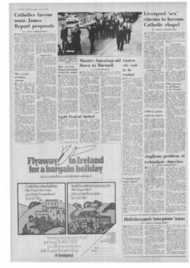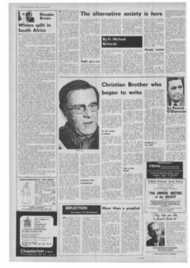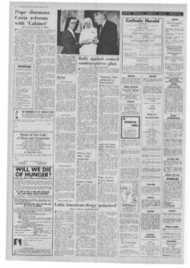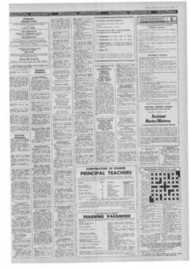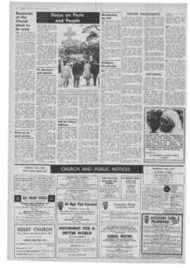Page 4, 23rd June 1972
Page 4
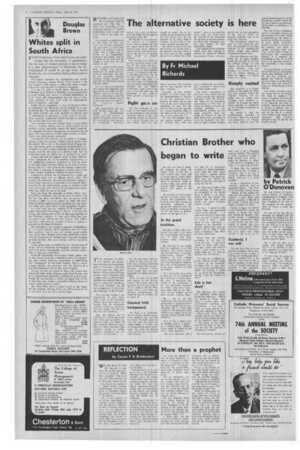
Report an error
Noticed an error on this page?If you've noticed an error in this article please click here to report it.
Tags
Share
Related articles
Sixteen Documents From Pope Leo Xiii
Story Of Russia's National Church
Europe
Whitefriars Chronicle
The New Christian Order
Christian Brother who began to write
by Patrick ODonovan
T6 be accepted as ortho
dox before the people, this is not the most important goal of Christians. And this is more true now than ever before. To be a vessel of love, to serve one's conscience like a happy slave, to know God, all these now outrank the pursuit of a classical orthodoxy. The word "heretic" has all but dropped out of the working language of the Church.
The men and women I am interviewing in this small, quiet series in the Ca-moue HERALD, have been chosen not because they are necessarily orthodox—some are, some are not—but simply for the fact that they are Christians.
And the fishing net of Christianity is being east wider and wider and its meshes are growing larger and larger. If this statement distresses some, then you must remember that reporters. except in certain women's magazines, arc not meant to be comforters.
For the particular Christian 1 spoke to last week is, certainly not a strictly conforming sort of Christian. He is a spectacularly successful writer whose novels have an extra dimension of compulsive readability.
Most of them have dealt with aspects of the Roman Church. All of them deal with questions of conscience, and to all his subjects Morris West comes with a very firm and personal interpretation. He would he the first to allow you to reject it.
Classical Irish background
Mr. West is an Australian. He is a sturdy, elegant, loquacious, ebullient man—not tall, but broad. His native accent is faint but real. He wears his origins lightly, as if they were of comparatively minor significance. He wears his learning easily and his deep convictions with tolerance. He does not aim to shock. His manners are gentle. He clearly walks a road that is more private than most, and I suspect that he would rather be caught dead than doing anything so spiritually vulgar as waving a flag; and among the rejected flags would be the yellow and white of the Vatican.
He was born in 1916 in Melbourne of classical Irish background. His grandfather was an Irish rebel who became an
Australian , policeman. He started his education with the Christian Brothers at the age of 14. He left them, as Brother Faber. at the age of 26.
In the grand tradition
He talks of them with a fastidious love that is far from the conventional self-justification of those who have rejected some inconvenient , cloister.
He said that he was taught and was teaching in the Irish tradition. This meant that, at the time, this was a "Jansenist, authoritarian attitude.The Brothers, he said, change slowly, because they are without a real theological tradition, but some of the teachers were in the grand tradition of Irish scholarship.
Yet it would not serve to try to find any of the traditional Irish attributes in Morris West. He says: "I remained very rigidly in the intellectual, if not the emotional traditions in which I had been bred— until quite late in my life." Now he has stepped out of them without insulting them.
He is one of the few Australians who says he is not going back to Australia to live. He likes England. but not passionately, and is a visitor here largely for the education of his children who appear to be colonising various Catholic establishments.
Now he has a small estate in Sardinia and is at peace— no, is clearly happy—within a Latin world of which he has had a wide experience.
'Ibis is an interview. and it can only be an inadequate account of a man's experience. Even using the other man's own words, a reporter cannot tell the Whole Truth about another man, and, indeed, the Whole Truth does not exist on earth. But we try.
Mr. West had trouble in his first marriage. He turned for an annulment to the Sacred Rota in Rome — an organisation that has broken the religious legs of many good people and given unwitting scandal to nnire
He says: "1 hoped to find redress within the established
system of the Church" . "I addressed myself to them with great care and I found it did not work. I wrote a book based on my experience — 'Scandal in the Assembly.' I did this much later and, indeed, I left it until I could write it honestly." (Mr. West has since remarried.) Faced with the Vatican equivalent of the Inns of Court he said: "I addressed myself to them with great care and I found this did not work. I came slowly to a reaction which has not been an ordinary sort of reaction.
"It's been an evolution towards a liberty of spirit which I believe to be essentially Christian. For a long time, because of my equivocal status within the Church. I would not go up to the Sacraments, though I took my children to Mass."
'Life is too short'
His marriage case clearly and inevitably looms largely within his experience. "During ray period in Rome there came a certain point, after considerable searching and consultation — and with, I think, as much honesty as a man can command in this life -when I said: 'Sorry. This is enough. Life is too short. The mercy of God cannot be limited by canonists. Sorry chaps — I'm going to the Table. And if you want to bar me, you bar me!' My position in conscience is tenable."
He talks quietly, and he has been over it all a thousand times by himself. "My position in public testimony is clear. I both protest and affirm. 1 make no pretence to virtue. I call myself a Catholic I belong to a universal Church.
"1 think that the essential identification lies in being a Christian, that is to say, in trying to affirm what Christ affirms. The rest is a social accident."
So he is dismissive of conventional authority and of organised dogma. "The Trinity is not really relevant to me — despite all the genius that went into the synthesis of that doctrine. I don't think God makes a mystery of himself to his people. I think that man makes a mystery of God."
Clearly he hives the Church of his fathers: But clearly the setback in Rome has made him rethink his position within that Church. "I understand the visible community which is the Church, and the community of people who care, care for human dignity. There has to be a visible community, but you must not make martyrs of the people in it."
'Suddenly, I was sick'
The last book that he wrote and had published was a romantic novel. It was a story of hunting and sailing and shooting and making love in. the Hebrides. In a way it was a sort of rejection of the world, a sort of "to hell with you all" couched in the irresistible terms of a great craftsman.
He had written of ecclesiastical politics, of American machinations in Vietnam. And somehow he was left scanfled. "Suddenly I was sick of the savagery of the world." And he wrote a story for pleasure.
So now he has the life he designed for himself and the prosperity he worked for. He has found a faith that suits his not uncommon dilemma and I do not think it is as rare or lonely a faith as it sounds. This man is set somewhere near the centre of the experience of men today, and this is not, of its nature, an altogether peaceful place.
His is not the view of a young and untried person. And if it is couched in paradox, paradox is a large part of the language of faith.
"I don't want to engage in polemics. I don't want to argue anything with anyone.
Want to say: 'This is my experience. What is yours?' I want to learn. I don't want to be told,"
blog comments powered by Disqus


